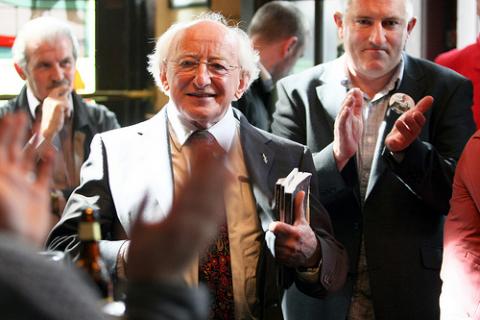Disillusionment looms - for Michael D and for us

The only reason the Government refuses to countenance increasing the tax rate paid by the wealthy is because of an ideological fixation on the idea that the rich must be protected. By Vincent Browne.
Maybe, in seven years' time, we will reflect on a bright moment on a dreary November day, when a new president offered a ray of joy and hope that illuminated our otherwise dark perspectives.
That ray of joy and hope spoke of solidarity, of a people who grasp the deep meaning of the proverb 'ní neart go cur le chéile'. It spoke about an inclusive citizenship where every citizen participates, and everyone is treated with respect and equality.
If we recall that moment, will it be with a sense of a lost opportunity; of failing to see the option of a different, inclusive, equal society; of the possibilities of other versions of society and economy?
For the omens suggest that the ray of joy and hope is fleeting, that we face a very dismal future, committed to retaining a version of society that has done much to propel us into the misery that now threatens to engulf us, ignoring the possibilities of solidarity and a radically more equal society in which we would all be happier.
The prognostications are piling up, pointing to a further and prolonged recession, deeper austerity, more cuts in public expenditure, more taxes that will most affect those least able to cope, more unemployment, cuts to health and education, shorter lifespans and worse health for the poorer half of society, as well as less influence and less respect.
All this is accompanied by the familiar rhetoric about protecting the vulnerable and the stuff about cherishing everyone equally, while building a society that does the opposite.
The belief that the survival and vigour of financial institutions are essential to the wellbeing of society in general - in ways that adequate educational and health systems or housing are not - remains persistent, predominant and unquestioned.
It is as though financial institutions were good in themselves, rather than just instruments for the pursuit of the good of society and its people as a whole.
This masked the point that the main purpose of financial institutions was to enrich the already rich.
They speak of 'reforms' - essential and urgent reforms in Greece and Italy. Reforms are a synonym for the imposition of austerity on the people of those countries, primarily the people least able to bear austerity, rather than the people who benefited most from the good times.
Reform is now another weasel word in our public lexicon, masking cruelty - or rather more cruelty - for the poor, those with special needs, the sick, aged, unemployed and ignored.
The budget for 2012 plans public expenditure cuts targeted at those very people they protest that they protect, through public expenditure cuts and taxation (such as increased Vat rates), while leaving untouched income tax increases that could require those most able to contribute to pay their fair share.
Data I obtained from the Revenue Commissioners (relating to tax cases, rather than individuals, and including individuals and couples who pay tax jointly) showed that individuals or couples earning €80,000 and over a year received one third of all income generated here, although they comprised only 9% of the population. So they are disproportionately rich.
These people earn, on average, €143,390 a year, yet they pay just 33% of their income in tax, including the 7% universal social charge.
Would it be so bad if, on average, they paid 40% of their income in tax, including the universal social charge? This would raise around €1.9 billion in additional revenue for the state.
The only possible explanation for exempting this group from this higher charge is because of an ideological fixation that the rich must be protected.
Michael D Higgins spoke of the constitutional convention and the necessity to renew the Constitution. There will be bits of improvement here and there, but two elements will remain the same. We will continue to have a dysfunctional political system with governments responsible to nobody, aside from the five-year plebiscite. And the people will have no direct say about anything, aside from the plebiscite and the occasional constitutional referendum.
There will be a direct say on the reconstitution of the EU that will give the lead states (Germany and France - or maybe just Germany) hegemonic control over the rest of the union, determining budgetary strategies, harmonising taxes, controlling trade and competition. That's not how it will be presented, but Ireland will be given notice to accept the new arrangement, or else - and there will be no appetite for 'else'.
There will be a few new wars, perhaps a war soon against Iran. If the Americans want to use Shannon Airport for that war, or any other war, they will get it, Higgins notwithstanding.
The next seven years will probably be a tough time for Michael D - and disillusioning for him and for the rest of us.
Image top: The Labour Party.
